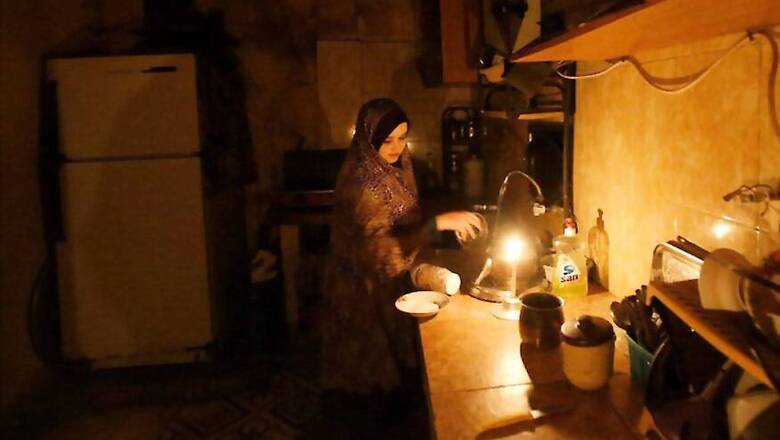
views
GAZA: With the prospect looming of a Middle East peace initiative by a new U.S. administration more sympathetic to Israel, Palestinian President Mahmoud Abbas has decided to turn the screw on the Hamas group that has kept Gaza out of his control for a decade.
Israel does not engage directly with Hamas, regarding the Islamist group as a terrorist organisation.
The PA declined to say why it had taken the step, but had already put pressure on Hamas by withholding the Israeli fuel that until two weeks ago powered Gaza's only generating plant, and slashing the salaries of the civil servants who are one of the mainstays of Gaza's struggling economy.
Medical workers say health services are on the verge of breakdown, while shopkeepers say they are struggling.
Hamas official Ismail Rudwan reacted with fury, warning of "an explosion in the face of the Zionist occupation" and saying that anyone who had "collaborated with the occupation" would have cause for regret, whether from the PA or not.
"We will not pay a political price for this crime," he said.
Ostensibly, the reasons for the withholding of fuel and the salary cuts were non-payment of bills, and shortage of foreign donor funds.
Palestinian Prime Minister Rami al-Hamdallah, based in the West Bank, made no secret of the PA's political motives on Wednesday, saying at an event in Ramallah that the lifting of the salary cut depended on Hamas moving towards reconciliation.
"I think there is a golden and historic chance to regain the unity of our people," he said. "Hamas should relinquish control of Gaza."
CIVIL WAR
Abbas's Fatah movement, which controls the PA, fought a brief civil war with Hamas in Gaza in 2007, which led to Hamas seizing full control of the territory a year after winning parliamentary elections there.
Several attempts at reconciliation, most recently in 2014, have failed to produce a power-sharing government for the West Bank and Gaza, and analysts say Abbas is now trying to force the issue.
Health officials say the Gaza Strip's 13 hospitals and 54 medical centres are running short of funds and fuel for emergency generators.
They say some 620 kidney patients in need of dialysis three times a week and newborns are at particular risk from blackouts, with generators at all the medical facilities using a total of some 2,000 litres of fuel per hour.
The PA has also slashed the salaries of its 60,000 civil servants in Gaza - but not the West Bank - by 30 percent, offering no explanation other than a lack of foreign aid money.
The civil servants' pay is one of the few sources of steady income that trickle through the Gaza economy, and supports tens of thousands of extended families.
Store owners complain of the weakest sales in years.
"After God, the country (Gaza) depends on the salaries of the employees," said Fahd Abu Sultan, 28, a shoe salesman.
Economists said the wage cuts would also shrink the tax revenue collected by Hamas - which it in turn uses to pay the 40,000 employees it has hired in Gaza since 2007.
Hamdallah said Hamas should accept an Abbas initiative to form a true unity government immediately and then go to presidential and parliamentary elections, which have not been held for more than a decade.
"Let whoever wins rule," he said.
THORN IN ABBAS'S SIDE
Hamas has been a thorn in Abbas's side for his entire 12 years in office, but the 82-year-old appears to have been stung into fresh action by Trump's election.
In suggesting that he will try to revive Israeli-Palestinian peace talks, he has struck a much warmer tone than his predecessor towards Israel and its settlement building in occupied Palestinian territory, and thrown into doubt Washington's commitment to a Palestinian state alongside Israel.
Within weeks of Trump's election, Abbas took steps to shore up his authority in the West Bank by tightening his control of Fatah.
But his biggest weakness remains the fact that Gaza is controlled by a movement shunned as a terrorist group by the United States and the European Union, as well as Israel.
Hamas has, since its founding in 1987, advocated the destruction of Israel, seeking all of historic Palestine as its land, even if some of its leaders have indicated in recent years that they would accept a more limited Palestinian state on land occupied by Israel in 1967 in return for a long-term truce.
Political analyst Hani al-Masri wrote in a recent paper that Gaza's status "allows Israel and regional and international parties to continue to question the legitimacy of (Abbas's) leadership and his representation of all the Palestinians".
"President Abbas realises that President Trump will ask him to be humble in his demands because 'you are weak and Gaza is under Hamas control and you have troubles inside Fatah'," he wrote.



















Comments
0 comment